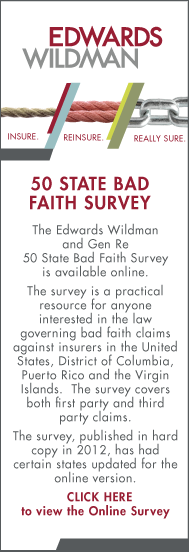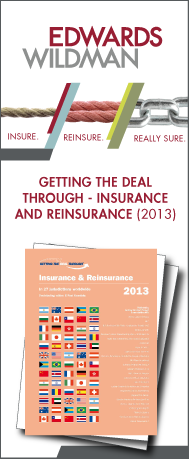 |
|||||||||||||||||||||||||||||||||||||||||||
| edwardswildman.com | |||||||||||||||||||||||||||||||||||||||||||
|
Follow Remains Contentious as History is Revisited by Mark Everiss and Sam Tacey (London) In the case of Tokio Marine Europe Insurance Ltd v Novae Corporate Underwriting Ltd [2013] EWHC 3362 (Comm), the High Court once again turned its attention to the construction, and the practical application, of follow the settlements clauses in reinsurance/retrocession contracts. The decision of the judge, Mr Justice Hamblen, raises a number of interesting, and perhaps controversial, issues in relation to the operation of “Scor-type” unqualified follow the settlements clauses, which are discussed in detail below. Facts The case concerned losses suffered by Ek Chai Distribution System Co Ltd (a Thai subsidiary of Tesco plc) (Ek Chai) arising out of the severe floods which hit Thailand in 2011. Ek Chai was insured under a global master policy (the Master Policy) issued by ACE European Group (ACE Europe) and under local policies issued by various local ACE subsidiaries (together ACE Europe and the local subsidiaries will be referred to as ACE) in accordance with the Master Policy. ACE were reinsured by various reinsurers (including the claimant, Tokio Marine Insurance Europe Insurance Ltd (Tokio)) under a facultative reinsurance (the Reinsurance) which covered a 55% share of losses sustained by Ek Chai up to a limit of £100 million each and every “Occurrence” (as defined in the Master Policy), excess of original policy deductibles. Tokio itself subscribed for a 12.5% line. Tokio had in turn obtained a retrocession from the defendant, Novae Corporate Underwriting Ltd (Novae), which provided cover for 12.5% of the losses sustained by Ek Chai in excess of £53 million up to a limit of £25 million each and every “Loss Occurrence” (the Retrocession). The Retrocession contained an unqualified follow the settlements clause (the Follow Clause) in the following terms: “This Contract is subject in all respects…to the same terms, clauses and conditions as original and without prejudice to the generality of the foregoing, Reinsurers agree to follow all settlements (excluding without prejudice and ex-gratia payments) made by original Insurers arising out of and in connection with the original insurance…” Ek Chai claimed for losses of approximately £125 million under the Master Policy and local policies and the claim was settled by ACE for £82.5 million. ACE then claimed under the Reinsurance, and Tokio agreed to pay its full 12.5% share of the £80 million settlement (net of deductibles under the Reinsurance). Tokio subsequently sought to recover under the Retrocession, but Novae refused to pay on various grounds. The present case concerned a number of preliminary issues as to the construction of the terms of various (re)insurance arrangements, including issues relating to the Follow Clause, as are set out in detail below. Preliminary Issues and Decisions Five preliminary issues were to be determined by Hamblen J, as follows:
The first issue Hamblen J was able to deal with the first issue without difficulty, stating that the cover provided by the Retrocession was expressed in general and unqualified terms, and that although the Master Policy was referred to in the Retrocession in order to set out the scope of the cover provided, that reference was for definitional purposes only, and was not intended to detract from the general nature of the cover provided. He added that from a commercial perspective, it would make no sense for the cover under the Retrocession to be limited to losses under the Master Policy only, as that construction “would lead to a radical mismatch between the cover provided under the Reinsurance and the cover provided under the Retrocession.” He therefore held that the Retrocession provided cover in respect of both the Master Policy and the local policies. The second issue As is stated above, coverage under the Master Policy was provided on the basis of any one “Occurrence”. The Master Policy defined “Occurrence” to mean “any one Occurrence or any series of Occurrences consequent or attributable to one source or original cause”. The Reinsurance provided cover on the same basis. The Retrocession, however, provided cover of £25 million each and every “Loss Occurrence”. Novae submitted that “Loss Occurrence” in the Retrocession was to have the usual meaning attributed to the phrase (and similar phrases) in the insurance context, namely “something which happens at a particular time, at a particular place, in a particular way”. Tokio submitted, relying on the fact that the Retrocession was stated to be “subject in all respects…to the same terms, clauses and conditions as original”, that the two concepts should be held to have the meaning as defined in the Master Policy. Hamblen J held that the word “Occurrence” and the phrase “Loss Occurrence” must have been intended to have the same meaning in the Reinsurance and the Retrocession. If the intention had been otherwise, he stated that he would have expected to see clear words to that effect, particularly in circumstances where the supposed differing meanings would have fundamental consequences as to the nature of the cover being provided under the Retrocession. The third issue The third issue was dealt with by Hamblen J very succinctly. He found that, based on the clear and unambiguous words of the Follow Clause (which stated that Novae was to “follow all settlements…made by the original Insurers” (emphasis added)), it was clear that Novae was to follow the settlement of ACE under the original policies, not that of Tokio under the Reinsurance. This was despite the fact that Hamblen J acknowledged that “there may be good reasons for preferring to follow the settlement of your counterparty rather than that of a third party.” However, he also noted that there were sound commercial reasons why the settlement to be followed was that of ACE, namely that the original settlement was “…the “coalface” and the level at which the substance of the claim will have been thrashed out and coverage issues determined.” The fourth issue On the fourth, and perhaps most significant issue, Hamblen J, having reviewed in some detail the extensive existing case law concerning follow the settlements clauses, and in particular the Court of Appeal’s decision in Assicurazioni Generali SpA v CGU International Insurance Plc [2004] All ER (Comm) 144, determined that Tokio need only show that the claim arguably fell within the terms of the Retrocession and did not have to satisfy the more stringent test that it did so on the balance of probabilities. In reaching this decision, Hamblen J stated that he considered himself bound by the Court of Appeal’s decision in Generali to the effect that the test that a settlement “arguably” fell within the terms of the policy in question applied to the outward policy - in the present case the Retrocession. It is clear from his judgment that he was reluctant to do so; he expressed some sympathy with Novae’s submissions to the effect that the first instance decision in Generali, and the decision of Mr Justice Evans in Hiscox v Outhwaite [1991] 2 Lloyd’s Rep 524 (which was relied upon in Generali) both focussed on the test of arguability in the context of the inwards policy and did not displace the usual balance of probabilities standard of proof in relation to the outwards policy. He added, “I also agree that in principle it is difficult to see why a lesser standard of proof than the usual civil standard should govern the application of the first Scor proviso to the reinsurance.” Nonetheless, Hamblen J, bound as he felt by the Court of Appeal, concluded that the relevant test was whether the settlement arguably fell within the terms of the Retrocession, as a matter of law. The fifth issue On the fifth and final issue, Hamblen J held that Novae was indeed bound by the determination made by ACE as to the construction of the aggregation provisions in the Master Policy and original policies. It was assumed for the purposes of determining the issue in question that ACE had accepted, as part of its settlement of the underlying policies, the argument that the definition of Occurrence was not affected or displaced by the 72 hours clause in those policies. The settlement was therefore made on the basis that given the occurrences were attributable to one source or original cause, there was a single Occurrence for the purposes of the Master Policy despite the fact that the losses occurred over a period greater than 72 hours. With reference to his decision in relation to preliminary issue 4 and applying Generali, Hamblen J held that the claim as recognised by ACE was indeed arguably within the terms of the Retrocession, such that Novae was bound by the determination as to the construction of the aggregation provisions of the Master Policy. Novae attempted to distinguish the present case from the facts of Generali on the grounds that the Retrocession was non-proportional excess of loss reinsurance, was not back-to-back with the Reinsurance and was one step removed from the direct insurance provided by ACE. However, Hamblen J was not persuaded by these arguments. He stated that although the Retrocession was not proportional, the interests of Novae and Tokio as regards the aggregation issues in this case were aligned. He also stated that the Reinsurance and Retrocession were, in fact, back to back in that their respective terms and conditions showed no material differences. Finally, he observed that Novae was only a single step removed from ACE in the chain of (re)insurance, which was not significant in the circumstances and very different from the position of the reinsurer in Hill v Mercantile and General Reinsurance Co Plc [1996] 1 WLR 1239 at the top of the LMX spiral. In any event, he also commented that the potential factual differences identified by Novae were not “sufficient in principle to displace the meaning given to materially the same unqualified follow the settlements clause in Generali.” Discussion As mentioned above, this case provides a number of interesting insights into the way in which the standard “Scor-type” unqualified follow the settlements clause will be interpreted and applied in practice. Second, and more significantly, the case has confirmed that, in relation to an unqualified follow the settlements clause, the reinsured need only show that the settlement in question was arguably within the cover provided under the relevant reinsurance. A reinsurer (or as in this case, a retrocessionaire) will therefore be bound by a settlement made by its reinsured (or, as in this case, the original insurer) as long as it arguably falls within the terms of the reinsurance (or in this case the Retrocession). The practical effect of this analysis is that it will be difficult for a reinsurer to succeed in an argument on an issue of construction under the reinsurance (such as the issue in relation to the interplay between the Occurrence and 72 hours clause in the present case) in circumstances where the same point has been addressed in the original settlement by the reinsured. However, Hamblen J’s decision is not the last word on these issues, as Novae has appealed to the Court of Appeal and had expressly reserved its right to argue that Generali was wrongly decided. Insurers will no doubt await the decision of the Court of Appeal (and perhaps, beyond that, of the Supreme Court) with great interest, but it may be some time yet before there is clarity in relation to these important issues as to the construction of follow the settlement clauses. In the meantime, this case serves as a powerful reminder as to the care that should be taken by insurers when it comes to the drafting of follow the settlements clauses. Contact
| ||||||||||||||||||||||||||||||||||||||||||
 |
|||||||||||||||||||||||||||||||||||||||||||



